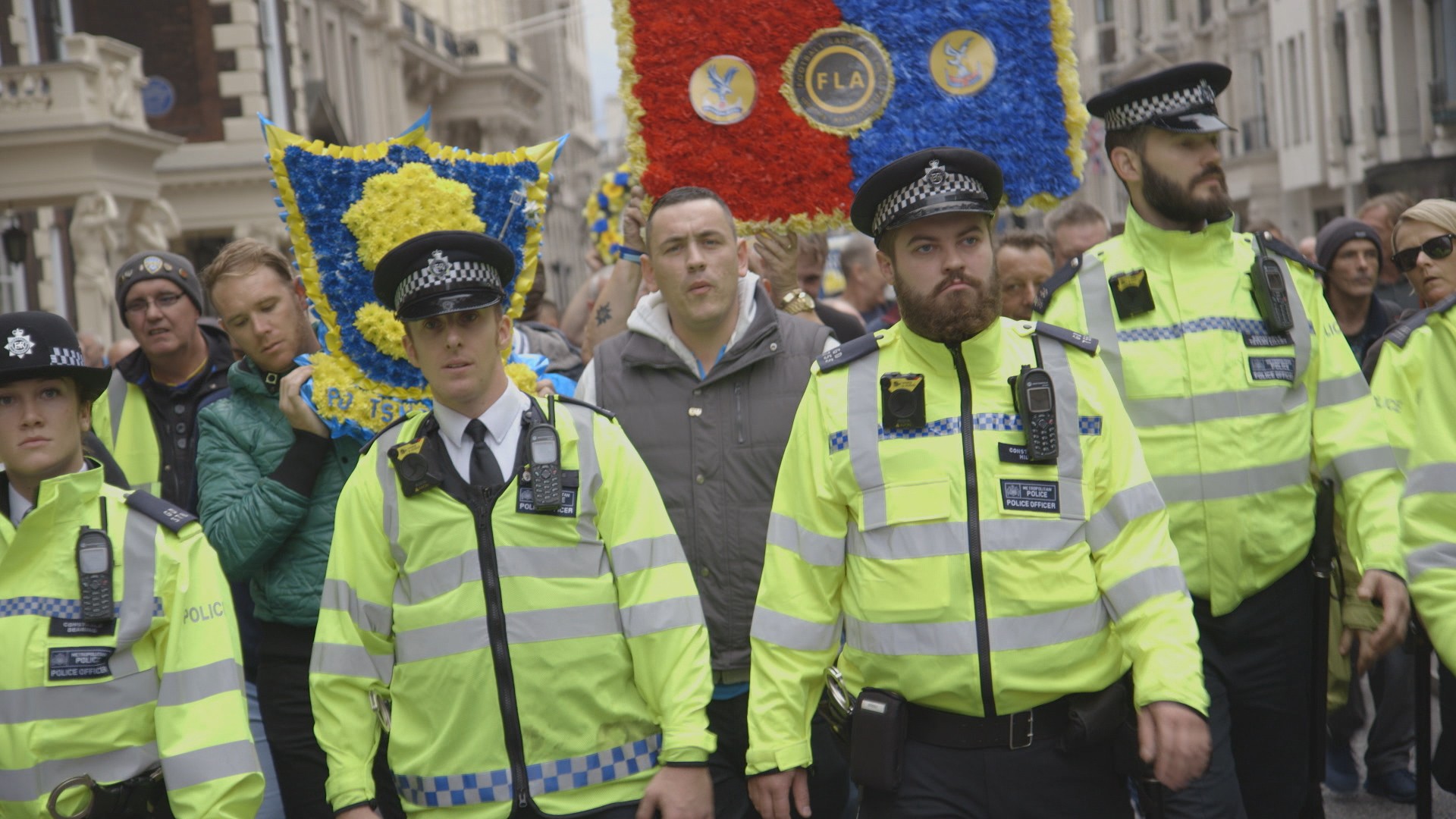Lorries queuing at Dover in September. This actually because of a storm. Could a No Deal Brexit cause similar scenes? (Gareth Fuller/PA Wire/PA Images)
It's war, friends. As Brexit talks enter their fifth round, with very little progress on the divorce bill, after her carrot-based Florence speech the PM has decided to switch tactics towards "stick". The Brits have begun to talk up the possibility of No Deal.If talks continue to stall, the theory goes, come March of next year, the UK could simply walk away from the table and devote itself to prepping against the shocks of the 29th of March, 2019. The Chancellor is being leant on to provide funding for this transition – more money for a fleet of HMRC customs men (some estimates put the number at 130,000), emergency subsidies for ruined farmers and probably a large stimulus package for the economy to smother the wobble. He has so far refused.No Deal prepping will always be a part of these kinds of bargaining situations – any negotiating hand is only as strong as the ability to walk away from the table.The real question isn't: "Can we plan for No Deal?" It's: "How bad will a No Deal be and how much difference will any of that planning make?"It's a dilemma neatly illustrated by the Chancellor's refusal to earmark extra money to No Deal funding, to concreting Dover and filling lorry parks with newly-trained HMRC customs agents. All fine… as long as the EU does exactly the same thing. If the French on the other end don't bother, then nothing happens.
READ:
So what's the most likely scenario if we do end up in the sci-fi scenario of No Deal Land? How bad could it be? Dead bodies on the streets, Kurt Russell looting grain silos, the establishment of a junta under Rees-Mogg? Or just a few more delays on the Chunnel?Headline finding: Mixed.For many things: Not that bad.For a few things: Positive.For some others: Fairly catastrophic.Let's zoom forward to the 30th of March, 2019. As of now, the UK is back to trading with tariffs set by the WTO.For most goods we export, European consumers are having to fork out an extra 2 or 3 percent. Of course, we're also applying these tariffs to European goods at our end, so the Treasury is filling up with Euros. The problem is that we're spending that 2 or 3 percent on running our vast new customs operation.For some, though, these tariffs are huge. Farming is the worst hit: lamb tariffs are 40 percent. Beef tariffs sum to around a 50 percent surcharge. This effectively stops most food import and export, destroying large supply chain businesses overnight. Everything is dismal, except that Brits can now feast on super-cheap mountains of unsellable Welsh lamb for at least six months.And the cheap food doesn't end there. Out in the seas, it's the Spanish who have been decimated, as Britain gets all its territorial waters back overnight. We send a few of Her Majesty's Destroyers out to patrol against rogue trawlers. Fish prices tumble, Grimsby accelerates from post-industrial dump into boom-town overnight.We'll have to make much of our Captain Birdseye bounty, because back in the financial sector that generated 11 percent of all UK taxes last year, things will be looking more peaky. In the City of London, with no agreement on what's known as "passporting", international transactions will snarl-up. And as they snarl-up, the pound will inevitably fall out of bed.Passporting means that you can provide financial services in Slovakia, say, from London, without having to apply for a national license there. It means that Barclays don't have to run around building headquarters and compliance units in every single country from Cyprus to Finland. Removing it creates endless cost duplication.Life still goes on. The City's roots are vast and deep: there are already more people working in the City of London than there are humans living in the whole of Frankfurt. Over time, though, the more Euro-facing parts of the financial services sector start to establish satellite bases on the continent. Over a two year period, somewhere between 5 and 15 percent of the City dissolves and rematerialises elsewhere.In the car industry, a 10 percent average tariff means the German economy starts to splutter like a Skoda in mid-winter (not for nothing do German auto manufacturers call Britain "Treasure Island" – we change our cars almost twice as often as the continental average). The Nissan plant in Sunderland cuts back on its hours. In the distance, the chill winds of recession start to blow.
Watch: Who Are the Football Lads Alliance?
On the upside, the whole matter of the divorce bill becomes irrelevant. We keep the 30-odd billion pounds we would otherwise have sent to the EU, and Brussels has a massive hole howitzered in their annual budget, which now has to be picked up by livid Franco-German taxpayers.Of course, economies can't be considered in isolation. The effect of all of these mainly-negative effects happening at the same time is the real effect. It's cumulative cholesterol in the arteries of the British economy.But the fact that we often forget in our No Deal panics is that almost every aspect contains an equal but opposite for the EU27. If Spanish fishermen, French farmers and German auto manufacturers go down, they'll take their respective governments with them. If Italian taxpayers are forced to double their EU budget contributions, then Beppe Grillo becomes their next PM.For all the talk about the unaccountability of the Brussels elite, it's the basic democracy of the EU's nation-states that will steer the clown car away from the cliff edge. No European country would allow a No Deal, because they each have something to lose.@gavhaynes
Advertisement
READ:
So what's the most likely scenario if we do end up in the sci-fi scenario of No Deal Land? How bad could it be? Dead bodies on the streets, Kurt Russell looting grain silos, the establishment of a junta under Rees-Mogg? Or just a few more delays on the Chunnel?Headline finding: Mixed.For many things: Not that bad.For a few things: Positive.For some others: Fairly catastrophic.Let's zoom forward to the 30th of March, 2019. As of now, the UK is back to trading with tariffs set by the WTO.For most goods we export, European consumers are having to fork out an extra 2 or 3 percent. Of course, we're also applying these tariffs to European goods at our end, so the Treasury is filling up with Euros. The problem is that we're spending that 2 or 3 percent on running our vast new customs operation.
Advertisement
Advertisement
Watch: Who Are the Football Lads Alliance?

On the upside, the whole matter of the divorce bill becomes irrelevant. We keep the 30-odd billion pounds we would otherwise have sent to the EU, and Brussels has a massive hole howitzered in their annual budget, which now has to be picked up by livid Franco-German taxpayers.Of course, economies can't be considered in isolation. The effect of all of these mainly-negative effects happening at the same time is the real effect. It's cumulative cholesterol in the arteries of the British economy.But the fact that we often forget in our No Deal panics is that almost every aspect contains an equal but opposite for the EU27. If Spanish fishermen, French farmers and German auto manufacturers go down, they'll take their respective governments with them. If Italian taxpayers are forced to double their EU budget contributions, then Beppe Grillo becomes their next PM.For all the talk about the unaccountability of the Brussels elite, it's the basic democracy of the EU's nation-states that will steer the clown car away from the cliff edge. No European country would allow a No Deal, because they each have something to lose.@gavhaynes
